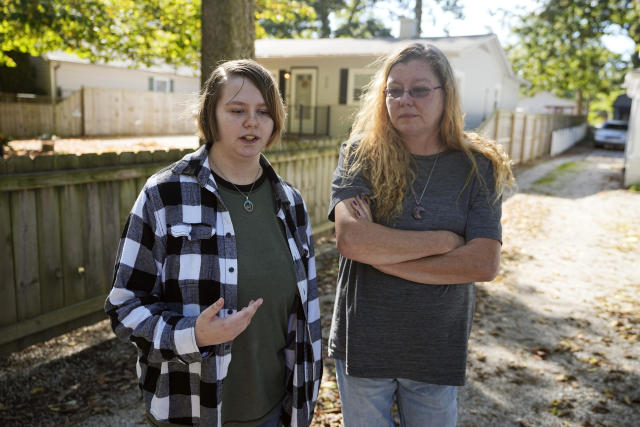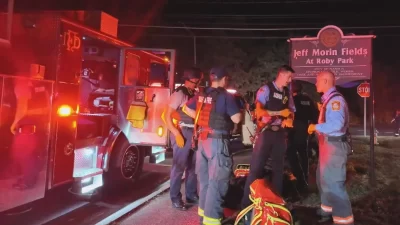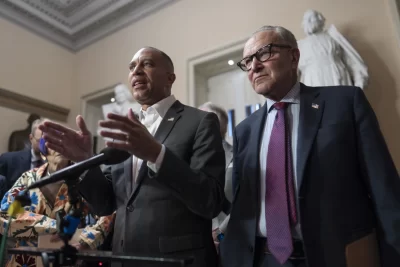
Indianapolis high school senior Caston Peters had used they and them or he and him pronouns at school for three years without a problem, but they came home a few days into this school year and told their mother that the situation had changed.
Peters, 18 and nonbinary, heard from a teacher that a new state law meant they wouldn’t be able to use those pronouns, or the first name they’ve used for years, without explicit permission from a parent because the pronouns and name don’t correspond with their sex assigned at birth.
This was news to Caston’s mother, Kim Michaelis-Peters, who immediately sent teachers, a counselor and the principal an email asking them to comply with Caston’s wishes, and the school staff did. But even though her own child’s wishes are being respected, Michaelis-Peters said she has deep concerns about what Indiana’s law could mean for students whose parents might not be understanding if they learn from school officials that their child is transgender or nonbinary.
“It makes me feel like there’s going to be a child out there who’s not going to feel safe at home to tell their parents and the school’s going to rat them out for wanting to be called a different name or different pronouns,” she said.
Indiana is among at least 10 states that have enacted laws prohibiting or restricting students from using pronouns or names that don’t match their sex assigned at birth, a restriction that opponents say further marginalizes transgender and nonbinary students. Most of the laws were enacted this year and are part of a historic wave of new restrictions on transgender youth approved by Republican states.
“The things that are passing are so vague and so hard to understand that (teachers) don’t know what to do,” said Cheryl Greene, senior director of the Welcoming Schools Program for the Human Rights Campaign Foundation, which advocates for LGBTQ+ rights. “It just creates this ambiguity and fear with educators because it’s not clear.”
Supporters of the laws have argued that parents should have a say if children are using pronouns or names different than those assigned at birth. Republican lawmakers describe it as a parental rights issue alongside efforts to restrict how gender identity is addressed in the classroom or in library materials.
“School districts can’t shut a parent out of their child’s decision about their gender identity because the child objects or because the school believes the parent isn’t supportive enough of an immediate gender transition,” according to a brief signed by nearly two dozen Republican attorneys general and filed in a lawsuit stemming from a California school district’s policy.
Mental health experts and advocates say that requiring parental consent or notification of pronouns forcibly outs trans students, who already face a high risk of bullying and abuse.
Similar restrictions have sparked some opposition in Virginia, where Republican Gov. Glenn Youngkin unveiled new model policies over the summer that include a requirement that minors must be referred to by the names and pronouns in their official records unless a parent approves something else. Some school boards have begun to adopt policies consistent with Youngkin’s guidelines while others have balked.
Some teachers in other states are finding ways around the requirements or defying the restrictions, saying they don’t want to put their students at risk. Since the laws are being enacted in states where teachers have little job protection, few are willing to talk on the record.
Jillian Spain, who teaches social studies at a middle school in Yanceyville, North Carolina, said she’s continued to address her students by the names and pronouns they use. Spain said outing a child, which is what the law would do to transgender and nonbinary students, “is not in the job description.”
Spain said the fear of being outed just adds to the pressures students already face, especially after the COVID-19 pandemic that devastated their well-being and academics.
“I am absolutely never, ever, ever going to out a child,” Spain said. “School is supposed to be their safe place. It’s supposed to a place where they can be who they truly are.”
Teachers’ groups say educators have been given little to no guidance on how to comply with the new restrictions, including basic steps like how to get permission from parents of students who use pronouns or names not listed on their birth certificates.
Indiana, like other states, leaves the specifics up to school districts.
The state’s teachers union says Indiana’s new parental notification law, which also bars teachers from providing instruction on human sexuality to students from pre-K through the third grade, is aimed at a problem that doesn’t exist.
“We have heard concerns anecdotally about the potential impact of this law,” Indiana State Teachers Association President Keith Gambill said in a statement. “Teachers are worried that it will create confusion and additional administrative burdens in an already demanding educational environment.”
Kentucky’s new law says teachers and school staff cannot be compelled to use a student’s pronouns if they don’t “conform to the student’s biological sex.”
The law, which includes other provisions dealing with student bathroom assignment and parental consent, has prompted confusion among educators, said Chris Hartman, director of the Fairness Campaign, the state’s highest-profile LGBTQ+ advocacy group. Hartman said it allows educators to ignore students’ wishes about pronouns even if their parents have asked the district not to let it happen.
“The mental health impact on trans kids being willfully misgendered by the adults in the room is disastrous,” Hartman said. He said supportive adults are crucial to keeping transgender students from slipping into depression and considering suicide.
Jefferson County Schools, the state’s largest district with 90,000 students, struggled to comply with the new state law. After a third try, the school board in Louisville adopted a policy that includes giving students with gender dysphoria an exception for bathroom accommodations and adds potential punishment for teachers and staff who willfully and repeatedly misgender a student.
A group of parents and students in Lexington have sued over the Kentucky law. One of the families alleges a school office employee intentionally refused to use their child’s name and pronouns while speaking with them in April. The parents, who are identified by a pseudonym, decided to legally change the child’s name after that encounter, according to the lawsuit, which was filed in late September. The suit asks a judge to declare Kentucky’s new law unconstitutional.
In Indiana, Caston Peters said they think other students will suffer because of that state’s law.
“School is supposed to be a safe spot for us where we can be ourselves without having to deal with being called out, without being bullied or name-called or anything like that,” they said. “And I think for some of us being able to be called the name or pronouns that we prefer it’s something we need. And if we can’t get that at home then having it in another safe place like school — if that’s the only place we can get it — well now it’s being taken away from us. “
___
DeMillo reported from Little Rock, Arkansas. Associated Press writers Sarah Rankin in Richmond, Virginia and Dylan Lovan in Louisville, Kentucky contributed to this report.







